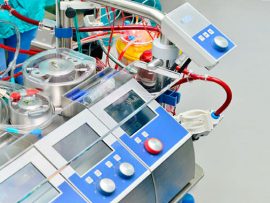Abstract OBJECTIVES Postoperative delirium (POD) is common, costly and associated with long-term morbidity and increased mortality. We conducted a cohort study to assess the contribution of cardiopulmonary bypass (CPB) to..
WeiterlesenAbstract Delirium, a form of acute cerebral dysfunction, is a common complication of postoperative cardiac surgery in children. It is strongly associated with adverse outcomes, including prolonged hospitalization, increased mortality,..
WeiterlesenAbstract Background Impaired cognition is a major predisposing factor for postoperative delirium but it is not systematically assessed. Anesthesia and surgery may cause postoperative delirium by affecting brain integrity. Neurofilament..
WeiterlesenAbstract Objective: Postoperative delirium (POD) is strongly associated with poor early and long-term prognosis in cardiac surgery patients with cardiopulmonary bypass (CPB). This study aimed to develop dynamic prediction models for..
WeiterlesenAbstract Objective: Postoperative delirium (POD) is common after cardiac surgery. We have previously identified plasma sodium concentration and the volume of infused fluids during surgery as possible risk factors. Both..
WeiterlesenAbstract Objectives To study the timing, threshold, and duration of intraoperative hypotension (IOH) associated with the risk of (POD). Design A single-center retrospective observational study. Setting University teaching hospital. Participants A..
WeiterlesenAbstract Purpose: To evaluate if preoperative assessment with A Quick Test of Cognitive Speed (AQT) could increase the accuracy of predicting delirium after cardiac surgery compared to Mini-Mental State Examination (MMSE),..
WeiterlesenAbstract Background Accurate, pragmatic risk stratification for postoperative delirium (POD) is necessary to target preventative resources toward high-risk patients. Machine learning (ML) offers a novel approach to leveraging electronic health..
WeiterlesenAbstract Background Delirium is acute brain dysfunction associated with serious illness. Emerging data indicate that delirium occurs in greater than 20% of children in pediatric intensive care units. Cardiac bypass..
WeiterlesenAbstract Background: Postoperative delirium (POD) is a common complication in cardiac surgery especially in elderly population which can lead to a delay of weaning from ventilator and extubation. Cardiopulmonary bypass..
WeiterlesenAbstract Objectives Postoperative delirium is a common neuropsychiatric syndrome after coronary artery bypass grafting (CABG). We aimed to assess and compare clinical outcomes of CABG patients with delirium with a..
WeiterlesenAbstract Background: Delirium is a frequent complication after cardiac surgery and is associated with a higher incidence of morbidity and mortality and a prolonged hospital stay. However, knowledge of the variables..
WeiterlesenAbstract Objective (POD) is a common complication after cardiac surgery and is associated with increased patient morbidity and mortality. The objective of this study was to identify risk factors for..
WeiterlesenThe purpose of this guideline is to present evidence-based and consensus-based recommendations for the prevention and treatment of postoperative delirium. The cornerstones of the guideline are the preoperative identification and..
WeiterlesenAbstract Objective (POD) is a common complication after cardiac surgery and is associated with increased patient morbidity and mortality. The objective of this study was to identify risk factors for..
Weiterlesen




